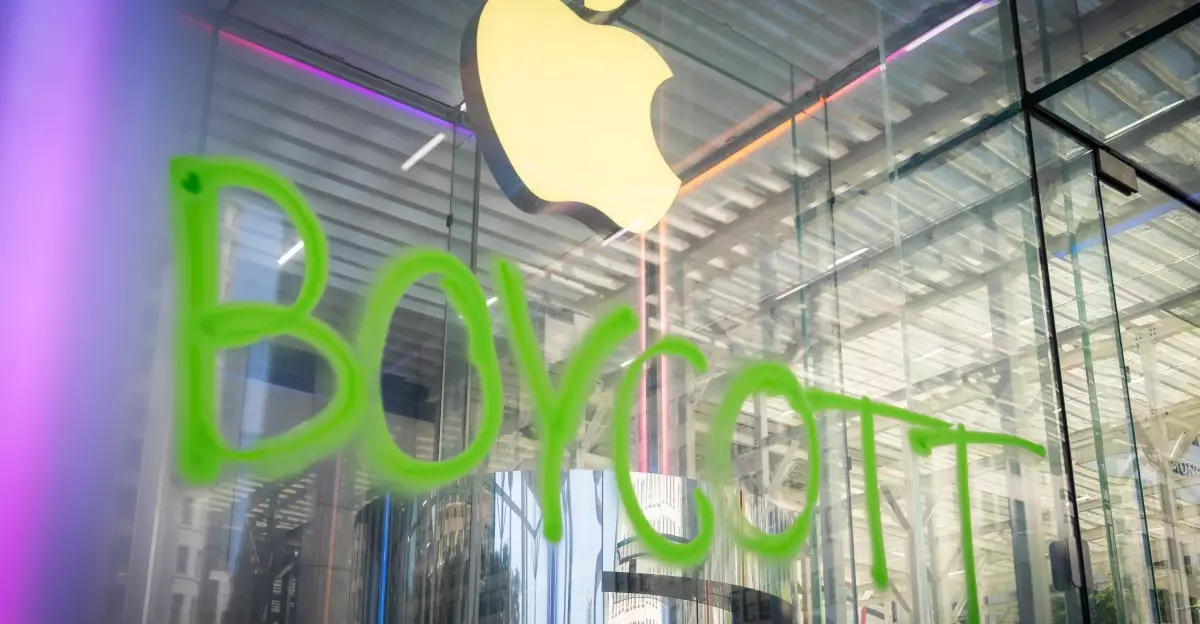In recent years, major technology corporations have positioned themselves as champions of environmental sustainability, loudly proclaiming commitments to the Paris Agreement and eco-friendly initiatives. Yet, beneath the sanitized corporate slogans lies a stark contradiction: these same companies continue to support policies and political figures that actively hinder climate progress. This hypocrisy isn’t just superficial; it reflects a deeper, systemic issue rooted in the conflict between profit maximization and genuine environmental responsibility. When Apple’s CEO Tim Cook publicly emphasizes climate action as a top priority, but then secretly funds political campaigns that undermine environmental regulations, it exposes an uncomfortable truth—corporate declarations are often just strategic marketing rather than authentic commitments.
Protest as a Reflection of Widespread Discontent
The recent Extinction Rebellion demonstration at Apple’s Fifth Avenue store exemplifies the mounting friction between environmental activists and the tech sector. By spray-painting messages such as “Tim + Trump = Toxic” and “Boycott,” protestors aren’t merely lashing out at a specific company but are highlighting a broader skepticism toward the tech industry’s sincerity. Their anger is rooted in the belief that these corporations disguise their environmental shortcomings behind greenwashing campaigns while continuing to support policies that favor fossil fuels, reduce regulation, and contribute to climate chaos. The protest’s visceral nature underscores how far many activists feel these companies have to go before they are seen as genuine allies in the fight to safeguard the planet.
Political Allegiances and Climate Hypocrisy
One of the core criticisms leveled by Extinction Rebellion involves the political commitments of tech CEOs. Despite publicly championing environmental causes, figures like Tim Cook, Sundar Pichai, and Mark Zuckerberg have maintained connections with political figures such as Donald Trump, whose administration was notorious for rolling back environmental protections and laxly supporting the fossil fuel industry. The protest’s messaging suggests that corporate support for climate initiatives is superficial when it coincides with backing political figures who actively oppose climate legislation. This alliance of corporate leaders and right-wing politics underscores a grim reality: climate action is often compromised when economic interests or political loyalties take precedence over genuine change.
Environmental Consequences of the Tech Sector’s Growth
The protest also brings attention to an often-overlooked aspect: the environmental footprint of the burgeoning AI industry. As AI and data centers expand, energy consumption grows exponentially—potentially surpassing that of the entire cryptocurrency sector. Recent reports reveal that tech giants like Google and Microsoft have experienced substantial increases in carbon emissions due to their data infrastructure. These developments seem at odds with corporate claims of sustainability. Instead of leading the charge toward a low-carbon future, these companies are inadvertently accelerating climate degradation through energy-intensive technologies. The discrepancy between rhetoric and reality becomes glaring when considering that some companies are caught investing in AI in ways that threaten to undo years of progress in reducing greenhouse gases.
The Power of Activism to Challenge Corporate Complacency
The Extinction Rebellion protest exemplifies how direct action can disrupt the veneer of corporate virtue. By confronting these behemoth companies at their prime retail locations, activists force public attention on their hypocrisies. Labels like “Toxic” juxtaposed with the Apple logo are provocative, designed to evoke emotional responses and challenge consumers to scrutinize corporate motives. Far from being mere vandalism or attention-seeking acts, these protests are a catalyst to provoke reflection on whether the promises made by tech giants are substantive or superficial. They demand accountability, urging the public to question whether support should be based solely on brand image or backed by real, tangible actions that prioritize the planet over profits.
What This Means for the Future of Climate Advocacy in Tech
The ongoing tension between technological innovation and environmental sustainability reveals a fundamental dilemma. How can society reconcile the undeniable benefits of technological progress with the urgent need to drastically reduce emissions? The tech industry’s role is pivotal—its choices now will shape the trajectory of future climate outcomes. If corporations continue to prioritize growth and shareholder returns over sustainability, public trust will erode, and activism will intensify. What is needed is a genuine shift: commitments must be matched with transparent actions, and corporate political contributions should align with climate goals—not undermine them. Until then, protests like those by Extinction Rebellion serve as an important reminder that words without deeds are nothing but toxic symbolism.


Leave a Reply